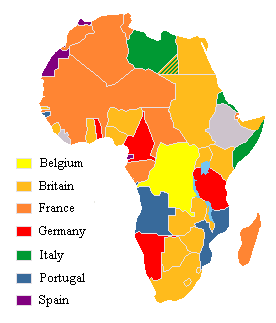|
TERRITORIAL CLAIMS

Under this principle, the imperial powers of Europe laid
claim to specific territories to prevent war from breaking out between them.
Having little knowledge of the interior of the "Dark Continent", most borders
were superimposed with little regard to cultural or physical boundaries.
The Free State of the
Congo was confirmed as private property of the Congo Society, effectively making
it the possession of Leopold II.
Also, under the
"Principle of Effectivity", it was determined that territorial claims could only
be made if the country possessed the actual land. By this they meant that
any
fresh act of taking possession on any portion of the African coast or the
interior would have to be notified by the power taking possession, or assuming a
protectorate, to the other signatory powers.
FREE TRADE

Since the ultimate
goal of imperialism was to increase a country's power and profit, the principle
of free trade was of particular importance. Under this principle, the
signatory powers
established free trade throughout the Congo basin as well as Lake Niassa and
east of this in an area south of 5° N.
The Niger and Congo Rivers were made
free for ship traffic, opening the interior for trade. Perhaps the most
noble of acts passed by the
Berlin Conference was that of an international prohibition of the slave trade.
The members of the conference even went so far as to recommend punishment for
any one who engaged in the slave trade.
|